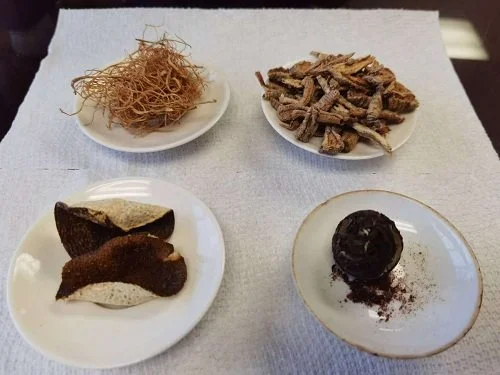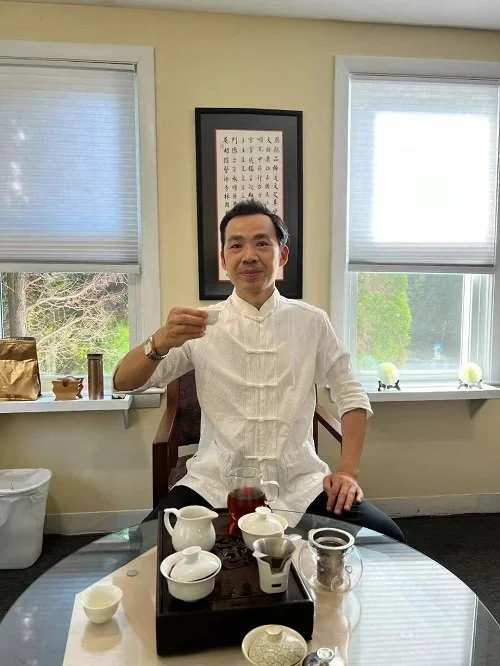Turning Waste into Treasure: The Useless Becomes Useful—Fengyang Ginseng Insect Dropping Tea
July 11, 2025, by Chen Qingzhen
During my two years of advanced study with my mentor in the U.S., I often had the opportunity to participate in the entire diagnostic and treatment process—from observation, listening, questioning, and pulse diagnosis; the eight principles of differentiation; determining the treatment method and prescription; to precise treatment and follow-up care. My mentor always patiently answered my questions, and his teachings, along with the immersion in Fengyang culture, benefited me immensely. Each time, it felt like a revelation, as refreshing as sweet rain. I am deeply grateful for this rare learning opportunity and the bond between mentor and disciple.
At the Fengyang Traditional Chinese Medicine clinics in Massachusetts and Connecticut, I often prepared health-preserving herbal teas for fellow practitioners and patients: tangerine peel dark tea, Solomon’s seal and goji berry tea, red dates and mistletoe tea, poria cocos, barley, and foxnut tea… Whether brewed or steeped, the combinations were flexible and well-received, and I took great pleasure in it. Today, I’d like to share a tea that is both amusing and healthful, for everyone’s enjoyment.
In my mentor’s clinic, alongside the vast array of medicinal herbs, there are also many rare treasures from the six major tea categories. Perhaps influenced by my mentor’s subtle guidance, I too have become a tea enthusiast—sipping tea, reciting tea classics, loving it deeply. Before coming to the U.S., I worked in tea culture in China for a full decade. Tea is the "medicine of all medicines," sharing the same origins as traditional Chinese medicine. I particularly enjoy pairing aged teas with Chinese herbs for slow brewing, where tea and medicine blend into a unique flavor.
Last month, I stumbled upon a 20-year-aged white tea ball (5 grams each) on my mentor’s tea shelf, riddled with holes from tea bugs and mixed with insect droppings. It seemed a shame to discard it, so an idea struck me: the clinic happened to have a bag of bug-eaten medicinal herbs called shan hai luo (Codonopsis lanceolata). Why not try making "Fengyang Insect Dropping Tea"? Speaking of tea bugs and insect dropping tea, I know a little—domestic Liubao dark tea has "insect dropping tea," which is the excrement of insects that feed exclusively on tea leaves, similar in principle to the Chinese medicine "silkworm excrement"; Taiwan’s Oriental Beauty tea even requires insect-bitten fresh leaves to achieve its unique character.
Preparation Method: In a health pot, layer 2 grams of ginseng rootlets, 3 grams of tangerine peel, and 12 grams of bug-eaten shan hai luo, then place one insect-eaten white tea ball on top. First, rinse with room-temperature clean water and discard the initial brew; then pour boiling water and steep for three minutes. The "Fengyang Ginseng Insect Dropping Tea" is ready.
Tasting Notes:
Appearance: The tea liquor is golden and translucent.
Aroma: The fragrance is refreshing and uplifting.
Flavor: Mellow, smooth, and sweet, with ginseng and tea harmoniously intertwined.
Aftertaste: A long, lingering sweetness, endlessly delightful.
Insect dropping tea (Dragon Pearl Tea) must be made from the metabolic waste of healthy tea bugs (non-toxic) that have consumed safe tea leaves. The bugs break down the tea molecules into smaller particles, making them easier for the human body to absorb. In addition to retaining components like tea polyphenols and amino acids, it also helps regulate gut microbiota and metabolism. Ginseng replenishes spleen energy, shan hai luo nourishes yin and boosts qi, and tangerine peel strengthens the spleen and regulates qi—the three together balance yin and yang. Aged white tea, as the saying goes, is "tea for one year, medicine for three years, treasure for seven years," its effects nearing medicinal.
Pairing bug-eaten white tea with bug-eaten ginseng (shan hai luo belongs to the wild Codonopsis family) turns waste into treasure, making the useless useful, creating something from nothing. Yin and yang transform each other, following the natural way—isn’t that a joy!




